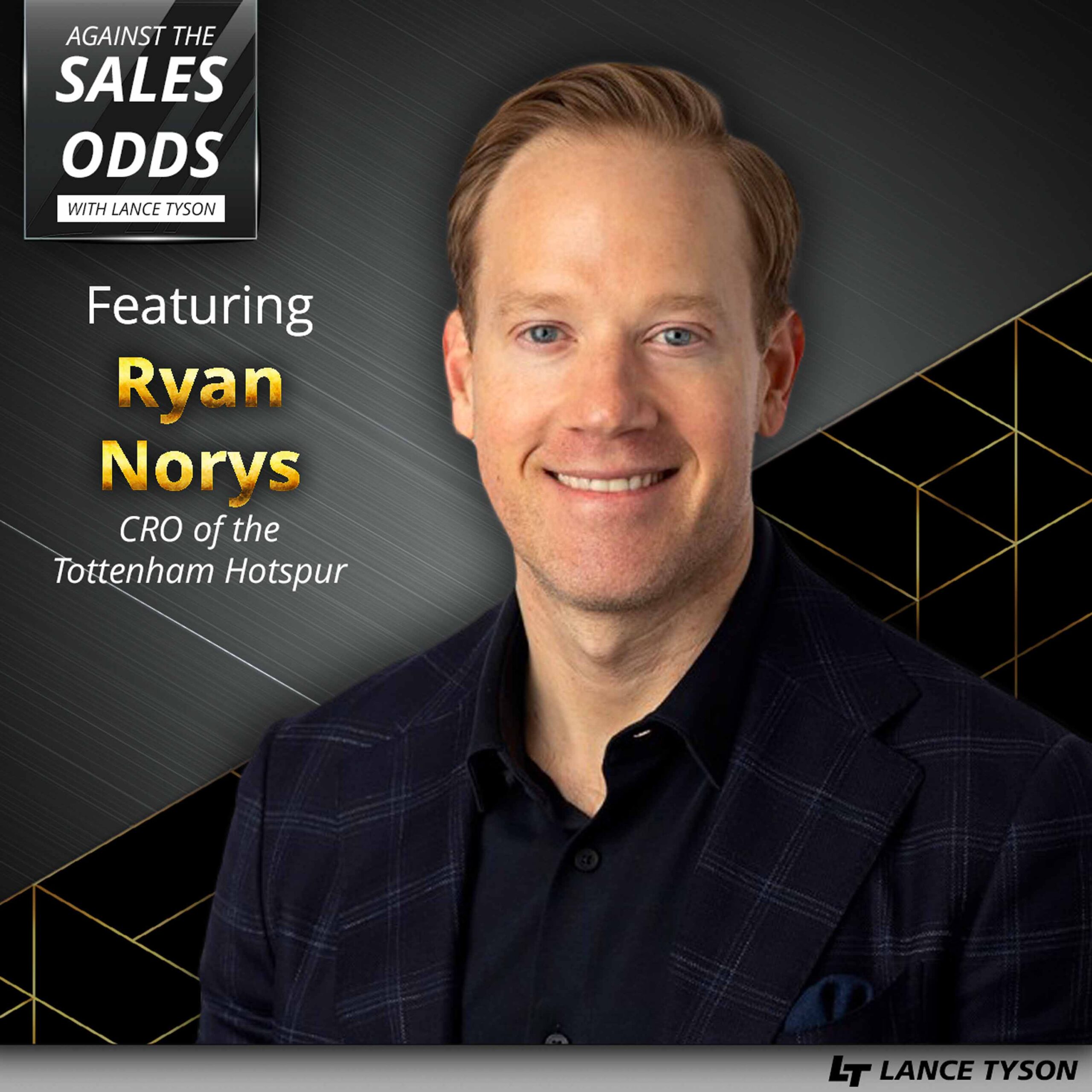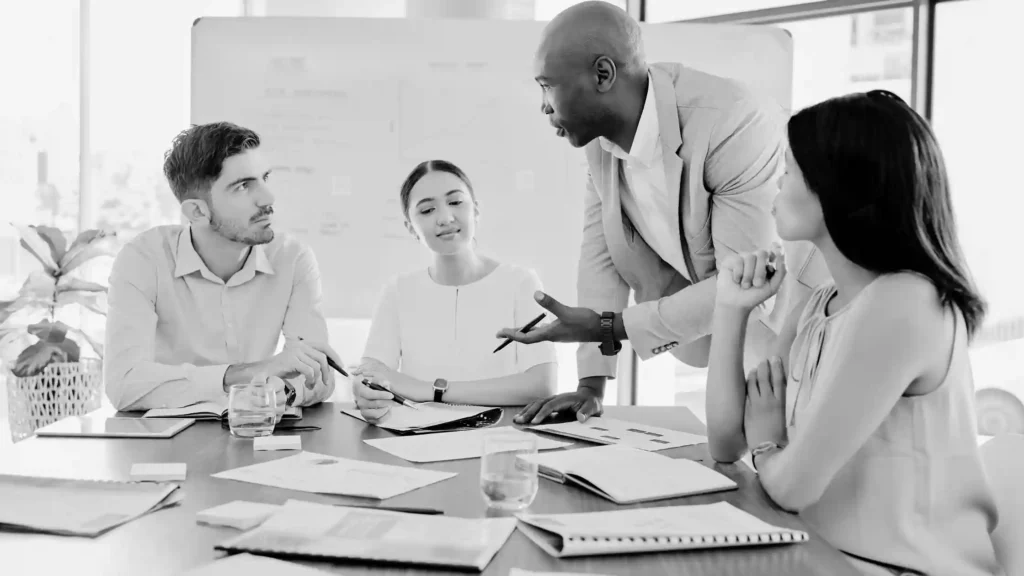In this episode, Lance Tyson sits down with Ryan Norys, Chief Revenue Officer at Tottenham Hotspur, to uncover what it takes to build and lead a world-class sales organization in one of football’s most iconic clubs.
Ryan shares his journey across different organizations, the lessons learned from early challenges, and how he developed a sales philosophy grounded in integrity, curiosity, and continuous learning. He opens up about leading a high-performing team with heart, navigating his transition to Tottenham Hotspur, and driving remarkable commercial revenue growth for the club.
Whether you’re a sales leader or just starting your career, Ryan’s insights on leadership, culture, and success will leave you inspired to elevate your own game.
Check out Tyson Group’s Open Enrollment Programs: https://www.tysongroup.com/openenrollment
Check out Lance’s Bestseller Books:
The Human Sales Factor – https://tysongroup.com/books#thehumansalesfactor
Selling is an Away Game – https://tysongroup.com/books#sellingisanawaygame
Download our playbooks: https://www.tysongroup.com/sales-playbooks
Schedule a call with one of Tyson Group’s member: https://bit.ly/41YJW7K
Subscribe to our Newsletter: https://tysongroup.com/#weeklynewsletter
Follow Lance across Social Media:
LinkedIn – https://www.linkedin.com/in/lancetyson/
Instagram – https://www.instagram.com/lance_tyson_1/
Love the show? Subscribe, rate, review, and share! https://www.tysongroup.com/podcast
—
Listen to the podcast here
Leading With Curiosity: Ryan Norys On Sales, Leadership, And Success
Sales odds. I have an old friend and someone we’ve done business with for a long time. We did business together in a lot of different places. Ryan Norys is the chief revenue officer for Tottenham Hotspur. The first thing I asked him was, “Am I saying that right?” My Premier League knowledge base sometimes struggles. Other than what I watch on Ted Lasso, just kidding. Ryan, thanks for coming on, man.
I appreciate it, man. It’s always good to connect with you, and glad that we’re able to do this. A bit informally, but also formally as well to learn more.
Global Vs. Regional Sales: Navigating Different Business Climates
I was telling you in the pregame that our audience is a senior leadership audience, but it’s also an audience of folks who are in sales. Give everybody some perspective with a Premier League team, what your responsibilities are, what reports up to you, what you’re trying to drive for the organization.
Effectively, I’m a part of the executive team for the football club as well as the stadium. We have the benefit of playing in arguably probably one of the best stadiums in the world, definitely in Britain, which allows us to have a plethora of different events, from we just had the NFL here this past weekend, rugby concerts, big boxing match coming on. I say that because it’s important, because it’s slightly different than maybe your traditional Premier League or even European football club.
From a responsibility perspective, effectively, anything that drives revenue across the Cleveland Stadium reports to me. This is anywhere from sponsorship to monetizing digital content to premium sales, tours, retail, major stadium events like the ones I just mentioned, our pre-season tours, and friendlies as well. Anything that drives revenue essentially reports to me across the board.
From a headcount standpoint, how big is your organization?
The whole club is probably close to 700 people now. I’d say from mine, when you factor in the global football development teams, we have global coaches all over the world, as well as the retail team. You’re probably looking at on any given day anywhere from 350 people. Give or take maybe 375. Around that range.
Real quick on the revenue stream. You started to mention that you have a partnership, you mentioned digital content, but you also have hospitality sales, tour sales, all those things. How many direct sellers report to you? I know there’s a massive group that supports the revenue efforts. What are the sales from the Seller?
If you look at all of those, I would call either revenue products or channels. I have effectively six direct reports that come to me, and each one of them is more or less responsible for that particular vertical and business unit. Obviously, they vary in size because you’re going to have a larger sponsorship team than maybe your stadium tours or your major stadium events as well.
We’ll get into this as we go through your trajectory. You, as a salesperson, or a great salesperson, and over yourself. You’ve got some big deals done that I personally know about over the years. What are you seeing? What’s the difference in the business climate between the UK and what you did in the US?
The biggest thing is that any US property that you have, let’s call it a regional limitation, as to where your marketing can go. I remember at the NFL, we had a 75-mile radius around our stadium. When you come and work for a club like Tottenham, we have almost over 620 million fans across the world. Obviously, we play in the UK, but that’s probably our 5th or 6th largest market. Just in terms of our fan base and where we’re targeting.
We’re truly operating on a global landscape. That’s been one of the things that I feel like I’ve excelled in. One of the things I enjoy the most is that I’ve done deals and done business in China, Japan, Africa, Latin America, all across multiple countries in Southeast Asia, Korea, Australia, you name it. There’s not really necessarily a country that doesn’t have an interest in the Premier League or European football. The landscape and the net that you’re extending are quite significant.
It’s a global sale.
It is. It goes anywhere from we’ll regionalize certain categories across different regions to maximize the category. In some cases, we’ll go and try to do a global deal if we find the right brand and the right partner.
From Selling Tickets To Stadium Naming Rights: Ryan’s Career Journey
That’s interesting. What I say, I’ve gotten asked earlier when we start to do how we facilitate this conversation, everybody always asks. How did you get here? Where did you start? Where are you from? Where’d you start? What was that first sales job? What’s that look like? That didn’t even have to be in sports.

I’ll start on the sports shop. If you look at my CV, I’ve had a lot of jobs, which is, in some cases, good because I’ve had a lot of experience and I’ve met a lot of exceptional people. I’ve had the benefit of working for several, what I would call, probably the best leaders across sports and even arguably in business. My first job, and this is one of them, was at AEG. I was selling tickets for the Los Angeles Kings. It was I just passed that area where they moved into inside sales. I started as an account executive. I was a bit fortunate at that level. I spent time there.
That was at Staples Center, then?
It was, yeah. To put it into context for those that are tuning in, if you will, at that time, we were selling the Kings and the Galaxy and the venue. You were all together. This was pre-segregation, even though my main focus was on the Kings. I had the benefit of moving into CSLMG, which, at the time, was pre-legends, but they would eventually become legends.
I didn’t realize you were a CSL then.
With Ben Wrigley and Bill Rhoda.
I just talked to Bill. That must have been fun.
It was, yeah. I came in halfway through the Yankees project, and this was right after the market crashed. Your first few phone calls, you’re asking people for $850,000 for a suite or $200,000 for two seats above the dugout at a time when they’re losing their homes and the markets are going down. It’s a super difficult sales environment.
What year was that?
That was going into 2009.
When the market crashed. That was the mortgage crash.
In January of 2009, we just moved into the new stadium. I had the benefit of not having to make that transition from the old stadium to the new one. It was a super competitive environment. I did that. It was successful.
Early Sales Days: Learning To Work Smarter, Not Harder
Before you go there, a real quick question. When you were at AEG, you literally went to two major markets and two big organizations. What’d you realize about, like, what was your sales process then as you went from one team to the other? What was Ryan as a seller like when you’re hawking like sweets and tickets and stuff like that? What’d that look like?
From being completely honest, I would say it’s funny when I look back on it now, because I see some of the either the approach or the attitude or the mentality that I had at such a young age, and you wish you can go back because I see people here and across my career and I’m like, “Man, I remember when that was me.”
I would say AEG was very much like learning. I was a bit too lazy to work smarter, not necessarily harder. I utilized the tools around me, which was probably a good skill set there.
I was 1, 2, or 3. I was talking to Chad Estis, one of the first ones I went to, “Where were you on the board of the Cavs?” He goes, “I was a solid 5, 6, or 7.” I was at the point where I was going to quit. I had told so many people I was going to succeed, I couldn’t even quit. I appreciate you saying that you’re like, “I’m not right at the top, but I was there.”
There’s not really necessarily a country that doesn’t have an interest in the Premier League or European football. The landscape and the net that you’re extending are quite significant.
I was like, just good enough to be annoying because they’re like, “What you’re doing is what we don’t want other people to do. You’re like, you’re messing us up a bit here.”
That’s a relative success, but we don’t want people to copy what you’re doing.
That started to happen. When I look back on it now, I’m like, I know that they placed X, Y, Z person in there to basically set the tone. First in, first out. Eventually, he ended up being the top salesperson, but initially, he wasn’t, so I’d look at it and say, “This dude’s making 50 calls a day, but I’m making ten.”
“My sales are higher. My closing issue is good. What are you talking about?” I love that.
The Power Of Big Asks: Overcoming Fear Of Large Numbers In Sales
It shifted to jump back into the Yankees, because this is somewhat of a redemption story for me. When I went to the Yankees, it was because of the way the room was set up as well. We’re in this office, and we’re sitting side by side, and we had some heavy hitters in that room. When you look at today, where they are in the industry, they’ve all had great careers, but there was no hiding. You couldn’t just sit there like that, and I basically was like, mentally, I got to make 50 calls a day.
This locker room was pushing the locker room.
Yeah, it was also the youngest one in the room. The second piece of it was that I knew Bill and Ben were part of my ability was availability. You’re in the sense that I was in New York looking for a job. It happened to be at that time when I wouldn’t say I was desperate, but I knew that I needed the job certainly more than they needed me.
I had to man up in a sense and be like, “I’m just going to hit these 50 calls a day.”
Have you ever considered, because you were young then, and how that really set the tone for it’s in his big ass, and you’ve done some monster deals that probably trained you really early not to be afraid of those big numbers.
Eighteen months. It wasn’t a long time. That was you’re selling group tickets, season ticket sales, you’re not asking for big numbers. It got me comfortable, but even more importantly, it fast-tracked me into putting myself in a position to move into sponsorship. I was able to do it a few years later. I used it, and everybody is going for jobs. Just because you may have been in this one, there are a lot of things that you probably were exposed to that you didn’t. It’s all about how you adjust that to every role.
Apex Hunter Mentality: Strategic Career Moves And Capitalizing On Opportunities
It makes sense because you never shied away, even when you were working at that fundraising thing that one time. You’re never afraid to ask for big numbers, which I’ve always appreciated. It’s like Apex Hunters. I didn’t mean to cut you, go back to the matter of lands, because that was your first bump up in the leadership there, correct?
Yeah, so it was more scope and responsibility, and focused responsibility on me because I was person 1A for CSLMG on the project. Obviously, they gave me a chance. I didn’t want to let them down, but this was in an environment where, again, you’re selling for both teams. Both teams have different markets. They market to their team, to their fans, differently. They have different ways of operating. I think this helped me learn at an early age, also the politics of how to manage, I guess, two properties, but also not only the egos that come with them, but also how and what information you can and cannot share. More importantly, how they want to receive information. That was the first foray.
That’s internal politics and what the play looks like internally.
We were in Switzerland. I could go in and have a conversation with the brand, and I’m going through my needs analysis. They may be a better fit for the Giants, but the price point may be better for the Jets. How do I also not lose a sale, but find a way to make a sale, but doing so by not upsetting the Giants, but by also delivering for the other client. You had to walk a fine line, but basically, I think that’s where you also really made sure you had to do a proper needs analysis and understand the objectives from the brand and what they needed to make a decision.
Where did you go from there? How long were you at that project? That’s when Legends started to come in with CSL.
Usually, when you think about a job, you’re either running away from something or you’re running towards something.
Legends started to come in, and I’d say the whole Legends experience, if you will, was probably around a little over three years, across a couple of different projects and properties. I think what makes me probably the most unique is that we talked about it a little bit in pregame, but I think I’m coming on either just over nine years of working in Europe and the UK, across London, Rome, etc. My first foray into it was when I was being recruited to go to Manchester City.
I’ve managed to leverage, I worked at Ink Stadium, MetLife Stadium, as well as the first couple of months on Levi Stadium with Al Guido and Michael Drake, and those guys. Gina as well, who you know. I was able to turn that into, “I knew I wanted to get into the sponsorship.” I didn’t have the experience, but I think I was in the right place at the right time and was willing to make that jump to move to England, sight unseen.
I’m glad you’re on that Man City or Man United? Go back to one thing, because this gets often overlooked. No matter where you’ve been, you’ve gotten the job done. Even when you were, we’ll talk in a minute about this, but I always admired that you’ve kept your career path, also where you’ve capitalized on opportunities in the best ways, where people are like, “How does somebody get opportunities like that?” You’re playing chess. It’s not a checkers, not to use too much metaphor there, but like talk about that a little bit. Were you always eyeing some upward that came to you because you were getting the job done?
Most of the opportunities that have come to me have come organically, have come through a relationship or a network. They come, and it’s something that I’m like, “This is actually worth running into or running to. It usually accomplishes some goal that I have.” I can jump ahead quite quickly, but when I was at the Prudential Center and going into the Dolphins, my primary reason for the Dolphins was that I looked at the sports landscape.
I’m like, “There’s probably ten people who have had the opportunity to sell naming rights, and a majority of them are all in an agency. This opportunity is, they’re not hiring an agency. It’s going to be a fast fail, but if Todd and I are successful. We can now be one of the, let’s call it, almost uncountable on two hands of people that have sold naming rights. I was facing a big deal, which is why I was there.
Hard Rock Stadium: A Landmark Naming Rights Deal
Everybody here is tuning in. I just want to clarify for the audience, what Ryan’s talking about is the naming rights for Hard Rock Stadium in Miami.
That’s correct.
That’s right. The corners are there, too. I’m sorry to interrupt, but people who maybe aren’t in sports follow, which is a massive deal.
We generated in less than three years, like 450 million of COI. It was a massive revenue story. In that case, going back to your question, I was chasing or running towards something. That’s what led to that. If you look at it from a career perspective, just to circle back and finalize the answer to your question, I’ve always just moved only if I was running towards something.
I love that. A lot of times, when I’m doing these, there is a strategy to it. It’s like you said, I’m trying to accomplish a goal. I see an opportunity that wasn’t there, and it could lend to my credibility, but I have to be credible to even get the opportunity. I’ll hit the rewind. From Levi’s Stadium, you get your first shot at Europe with Man City. What’s the role? Is that with Legends or is that with?
No, there’s not with Legends. In a way brought Legends into it from a catering perspective. I don’t want to say it’s probably a couple of months into it. This was back when Legends was still on the rise, right now. Obviously, they have a big European business, and they’ve managed to turn that into not only what started as maybe a catering relationship. I think they even did quite a bit of hospitality and sales with them at that time.
I actually reached out to Al, who connected me to Dave Checketts and organized a meeting with him. This dates you and goes back to where we were. I was actually hired in sponsorship, the first American to join the football club at Manchester City. They were nowhere near what they are today. I always say to people that we were wearing Umbro. It was like the right time, right place, you know what I mean, in terms of joining a club.
Looking back on it today, it was probably my favorite experience of all time in terms of my career, just because there was a sense of innocence, but just pride and collaboration and teamwork. Everyone was really just so proud of working at the club. We all just came at the right time and came together quite quickly. Initially, I was actually identified and hired to build the club in the US. Very quickly after realizing, and this was before NBC took over.
I did 2 to 3 months of research, consulting on different things, and realized, “I don’t think we’re going to find any dollars here.” I actually went back to the leadership team at the time, and I said, “If I just look at Facebook and Twitter,” and this is the time when Facebook and Twitter were like the social networks, “I was basically the top 4 or 5 markets of our fans are all in Southeast Asia.”
They were like, “You should go there.” In some cases, it was quite funny because you had an American who didn’t really know much about soccer, not an English club, but being tasked with growing the brand and driving revenue across Southeast Asia and Japan. Essentially, I was doing it with one slide. I knew the challenges that we had were a challenge club at the time. I knew how to sell against the other properties.

Going back to what you’re saying, one of the things that I’ve been proud of in my career is going to a place and just getting the job done. It was very similar to that. There’s no blueprint. There’s no playbook for it. No one was telling me what to do or how to do it. It was just giving me the opportunity to say, “Here’s an entire region of the world where people love football.” Man City is not one of their top 5 or 6 favorite clubs at this time, but go sort it out.
You had a lot of architecture going on there. That makes total sense. How long were you there, Ryan?
At City, known in various roles across the club, for roughly three and a half years.
I didn’t realize that you’ve been nine now, but I didn’t realize you had a stint before.
I didn’t realize that at all.
From there, you went where?
Building A High-Performing Culture: Leadership Lessons From The Devils
I had the opportunity, which I’m very fortunate to have, to work for Scott O’Neill. He had just bought, I guess they just closed in on Harris Blitzer Sports & Entertainment. I think they were maybe on day 30 of buying the Devils, if you will, and met with Adam Davis and effectively were like, “I’m City here. They have me in the New York office. They’re now in this position where they’ve created City Football Group. They want me to move to Singapore. I’m in New York. I got my friends. I’m living in Tribeca.” The dating scene is in the right place.
“My life’s in a good situation right now.”
Like, “I don’t need to go to Singapore.” I also knew what I needed from taking it back somewhat seriously. I knew what I was lacking in my career. At this point, I had said, “I got my foray into sponsorship. I’ve done deals in 6 or 7 different markets. I have this unique selling point from a personal brand perspective. I’ve always been trying to be very conscientious about that.” The one thing I lacked was that I had no leadership skills or experience.
Maybe I have the skills, but I don’t have the experience. I saw this as an opportunity where they were building a team. I got to learn under Scott O’Neill and Adam. At that point, you’re looking at it, you’re like, “There’s probably not a better scenario in sports.” In terms of this time of opportunity, where I was in my career, and what I need to do. I always say that I was very grateful. I think I was only there for maybe 15 or 16 months because this is what drove me to Miami.
That’s where I look back and I’m like, “I got my MBA there.” I learned how to build a team and manage that team. In fact, if you look at those three people that I first hired, I’ve either hired them again, they’re still best friends with them, and/or still consulting with them and helping them navigate their career. I’m trying to always pay it forward in that sense. I also really learned how to manage up. Wholeheartedly, I struggled at the beginning because I was thrown into an executive team.
That is where Scott’s sharing is at this point. At times, we’d have to present to the owners. Very quickly, I had to learn this. I think it probably took me 2 to 3 meetings, where I think one of the last ones, Scott was like, “You’ve got to sort this out.” Through that time period is that’s where I learned, one, how an organization should run.
This goes to earlier in the conversation, when you go to Miami, with the name rights there, and then you hook up with Todd Klein. He’s in a similar role you’re in.
He’s in a similar role you’re in. He’s the president of the commercial. We have a valuable list currently there and then figure out what we need to build to be successful. Not only that, when I described that experience, you have to be able to chew gum and walk at the same time. We’re driving down a freeway, while I’m also trying to change our tires, because you have the current team and property deals that you have to do.
You also have, what I estimated and discussed previously, around the new stadium, which is not a new stadium, it’s basically, they rebuilt, reinvested into new areas of the stadium in the building. You had to do both. We very quickly, because we had not worked together, I think you’re looking back on it, Todd was like, he’s got international experience, he was trained by AG.

He spent some time with Scott, so I know he’s going to come in well-coached. Now it’s about how quickly we can gel and then how quickly we can work together to say, “how do we divide and conquer to make sure we’re successful? The biggest takeaway is that there was no ego involved.
Very quickly, we aligned what we needed to accomplish. Either I would take a meeting or Todd would take a meeting. We quickly identified that we cannot be in the same place at the same time. I was responsible for trying to set the organization up for success. Those trains run on time, while we are also always keeping an eye on how we drive revenue in these big assets.
Leading With Empathy: Fostering Growth And Success In Your Team
You talked about before, and we haven’t touched on this, but I think it’s interesting for the next couple of stops as we start bringing some for a landing. You talked about managing up. You definitely have a sales philosophy that if you’re not paying attention to what Ryan’s saying, it’s to establish credibility, create opportunities where they didn’t exist, or capitalize on opportunities in front of you. What did you start to realize about your leadership philosophy, and how did it start to evolve, because that carries you into where you are right now?
I think very quickly, I realized like, I touched on the ego thing, but I never move with ego. I try to move with purpose. Everything that I do comes from a place of growth or with an eye on growth. I obviously want what’s best for myself. Most importantly, I want what’s best for everyone around me. Sometimes that can be uncomfortable if you don’t have people on board. The thing I enjoy the most about my job, more than doing a big deal, going into a game or a match, is really trying to empower the people around me and put them in positions to be successful and watching them grow.
Watching them develop those skills. A lot of times, like, “I’m not afraid, I’m a doer by nature.” I’m not afraid to roll my sleeves up and also do the work. Also, I try to lead with empathy. I’m going to steal something from a couple of different people. I always say I try to develop a high-performing culture with a heart in the sense that we need to have an incredibly high standard and high expectations. I also believe that if you can get the right people going in the right direction, you can achieve that.
That’s really well said. As you look at your next like quartile of like experience, you went from Miami. You guys got the job done there. Anybody flying over Miami or going to Hard Rock, that’s Ryan and getting that deal done. Where’d you go from there? What did it look like, because now you’ve got the last ten years almost from there?
I’d say some people may look at it and say it’s a slight left turn, which is probably true, but also, when I bring it back to today, there are some things that I’ve been able to implement at Tottenham that have stemmed directly from that experience. I went to work for a company called Omaze.
Please describe for those who don’t know.
It’s essentially a company that raises money and awareness for charity. They do so by creating experiences. Initially, with athletes, celebrities, we moved into cars, houses, travel, sneakers, etc. We could do a whole podcast just in that experience alone. The irony of it is, I was there for a little bit. I was doing quite well, making some waves and some moves around there. At the same time, one was at the Dodgers. They had like $80 million or something up for renewal. He was like, “Come and help me do this.” I was like, “I really want to keep this job as well for a while.” I was doing both.
I remember that.
I don’t know that I’d recommend it, but I was able to manage through it. Obviously, something had to give, and then Omaze asked me to come and basically lead their entire business development piece. When I look at it now, one, I surrounded myself with people who were significantly smarter than me, coming from Harvard, from Penn with MBAs and masters and various assets of things.
The biggest thing when I take it back on is the way they solved and approached problems. I brought a lot of that with me. Also, I’ve learned the value of a customer and not only what it costs to acquire them, but what it means to assess or assign a value to a customer. As we enter now into this cookie list world, the importance of a CRM, or let’s call it first-party data, because that it funnels your cycle across every revenue channel and product.
It helps sponsorship, helps premium, helps retail, helps e-commerce, and helps everything in your ecosystem. It really was a nice combination of tying that in, along with when you look at a sports property and you’re like, actually, they’re not too much different. We just need to view it as a fan because they’re going to care about slightly different things. At the end of the day, we cannot forget that they are a customer.
The Customer Is King: Understanding Value In A Cookie-less World
It’s a great perspective. I remember that time with you, too, because I was like, “I’m already trying to explain to myself.” Like, “I’m here and I’m there. It was vague.” I’m like, “Okay.” The Omaze thing was interesting. I remember being out there and the way they had to tell the story and things like that. It was almost like a reverse sail from what I can remember.
Transparency was key. You had to learn how to very quickly explain what you do. This is where I perfected the elevator speech, whereas now, from all the different things I learned, someone asked me, “What’s the proposition at the top?” I could do it in seconds. I learned it because I had to take a very complex, unheard of project and be able to explain it to someone as if speaking to a kindergarten class in a way.
Have the discipline to do it every day. Keep trying to get better — that’s what learning is.
I remember because you spent a lot of time with me. After all, I’m like, “Huh?” We had a reverse engineer. I go, “Now I get it.” From there, at that point, that’s when you start to move back overseas again. You went to Italy for a minute.
I had a brief stop at WME, which would probably have been significantly longer had COVID not hit, just because Todd and I rejoined to basically build a property sales team. We also had the talent sales in terms of as well of the team that was selling across some of the athletes that reported into us. That was the primary focus of the role.
Obviously, a lot of events shut down. We were in a lot of ways very fortunate and lucky to be able to still have a lot of talent and athletes and celebrities to sell for because that’s when those personal endorsements and creating content and tying brands into it and integrating it were really hot. It was very much on topic. We ended up doing, not just myself and Todd, but across the team, almost like 300 plus deals that year.
It’s very transactional, but you were doing the high frequency. About it’s almost a combination of premium sales and suites and stuff, but doing it in that area. Through that experience and while at WME, I started consulting for AS Roma under the IMD umbrella. I’d moved from LA to Austin, where my wife now was, but at the time wasn’t my wife, where she was living and working for Metta.
Basically it’s just a bit of a coincidence and just being in the right place at the right time again, where The Freakins, which are Dan and Ryan who own AS Roma, they were based, their family office and just overall infrastructure was based in Houston, short drive from Austin, had the opportunity to spend quite a bit of time with them and a guy called Brian Walker who’s on the project. About 6 or 7 months, they’re like, “You should really come and be the CRO for the club.”
Fast forward, and it took a few months to get there. I got married and then, within two weeks, had moved to Rome. A big experience. Again, only American at the club, reporting for American owners, living and working in Italy was two different things. Working had its challenges, living in Rome and Italy is an experience that I’ll never forget and never take for granted. It was unbelievable.
You remember you’re getting a Lamborghini with Omaze.
Yeah, with Omaze.
I remember talking one time, and you’re pitching Lamborghini at the Italian club.
The first one at Omaze was when I met the Pope.
That’s what it was.
That’s what it tied together.
That was amazing. I remember talking to you right before that, too. You’re like, “I got a meeting with the Pope and it’s with Lamborghini.” I’m like, “Huh?”
That was one of those deals that, like always remember for so many reasons, but it was a great experience
We get back to now, you leave there and then bring it to like where you’re right now. What was that from there? You stayed in Europe pretty much since.
It’s very hard to beat someone who doesn’t stop and doesn’t quit.
I did. I went from there to Tottenham. Again, I’ve been here a little over three years. I think we were talking about before, this was very much a club that had tremendous success in terms of, from a history and heritage perspective, it moved into a beautiful new building, somewhat impacted by COVID, but really, they were a club on the rise.
They were always in this sixth position, even from a commercial perspective. There was a tremendous opportunity. I had the opportunity to come in and basically start from scratch. I built a phenomenal team. I would say, probably, in my entire career of the most talented team now. Again, as we’re talking about, we’ve gone in phases.
I’ve learned that some of the people I initially hired were amazing in getting us to this point. When we needed to level up, we needed to change the formation, the dynamic. The same way that a football coach says, “We’re going to be a run-pass offense, where now we need to be a bit more defensive. You need to change personnel. You need to change information on how you’re going to market, what’s needed, what’s required.”
The architecture.
Yeah. That’s where we are. I’m very pleased to say that we are, we have the fourth highest commercial revenue now across the Premier League. We’ve surpassed both Arsenal and Chelsea. Also, in the past three years, we’ve had the highest percentage growth against any other Premier League club, including Manchester City, Liverpool, and United. It’s a massive accomplishment. Again, I’d love to take credit myself. Again, as I said, I have a phenomenal team, and we’re again in one of the best buildings in the world. We have the benefit of being able to leverage that.
Tottenham Hotspur’s Rise: A Philosophy Of Competitive Growth And Coachability
As you look across the last nine years in Europe, how would you sum up your philosophy of leadership, and then you definitely have a philosophy of sales. Speak to those two things. I love the move with purpose. High-performance culture with heart. How does that tie into your leadership philosophy? Break that down a little bit.
I’ve touched on a lot. I would say one of the things that I look for and try to build across the team is maybe a slightly different position I would take. I want people who are competitive and have discipline, but have their own self-determination. They know we’re not competing against the Chelseas and Arsenal’s of the world, even though I named them or F1. We’re essentially competing with ourselves, and how do we get better every single day?
I think that’s something that I just tried to instill. The second thing is, everybody needs to be coachable, including myself. That teachable spirit, questions before answers. I want people to be good teammates. I always go back to portraying it as friends. If you have a good friend, you want to be a good friend to them, and you want them to be a good friend to you. It’s no different. Be the team.
The biggest thing, TK and I have talked about this a lot because I think it’s one of the things we keep going back and for reference, TK is Todd Klein, those who know him well. Basically, it’s having the discipline to just do it anyway. We’re going to do it. Every day, you just have to try to get better. That’s learning. Never stop learning.
Don’t listen so much to what people tell you. It was a lot of times that people told you what to do. Those people don’t have the results you have. Usually, if you follow that, it’s a terrible decision. We’ve just talked about it consistently. We call it a test day. There are test days that come, and those days come, and you have to just get through them and do it tired. I’d say that’s probably the biggest thing.
I think from a personal perspective, and this is particular to sales as well, is that like every emotion is okay, and then we lose it. We get upset. It’s okay to mess up and make a mistake. Every behavior is not. As I look at what I consider myself or try to become, let’s call it an elite performer, it’s not acting on impulse. It’s how do I regulate that? How do I reset? How do I make a plan and go with intention?
I love that. So much insight. As I bring this down for a landing, I love how you look at opportunities. Move with purpose, move toward the opportunity. You’re thinking of the result you have to get, of course, for whoever you’re working with, but also at the same time, that personal brand building. It’s so important, and you have to see the whole field. How can I benefit somebody that I’m going to work with?
What can I bring to the table? I wrote that down three times. The last couple of things that you and Todd talked about resonate with me because I need to be around competitive people, and you have to be a good teammate. In sales, sometimes it takes a team to make a sale, but at times somebody has to run the ball or win that heat.
We all know that. I always look at you like that, Apex Hunter, man. You just always have been, you talk about the big deals, and if you’re listening to Ryan right now, I’ve seen him in different spots. His calmness in this is exactly who he is. Even when we would have tough conversations in Miami about talent, that’s exactly who he and I always are. I always remember working with you when he says he’s coachable. I’ve coached him directly. I know when I’m getting resistant versus people resisting coaching, you’ve never resisted.
I would always say probably the word I use with you, you’re always more curious than anything else. Why do you say that? Tell me more about that. There was always more of that. I was thinking of the boardroom. Later questions as we bring this bird down for landing. If you had to play any song in your head before you’re going to get big, if you had to go redo that naming rights deal in Miami or wherever, what song are you playing in your head? What’s that music? It’s always an interesting question.
It’s a good one. I don’t know that there’s a song. I know that’s a bit of a cop out. I don’t know that there’s a, there’s a specific song. I definitely listened to much more hip hop music, so it can be a bit much at times, but it’s more about getting into that vibe. It’s one of those things, like it’s more of that. I listened to it to prepare for confidence because it’s the most confidence you can have, and it’s that self-belief.

There are times when I literally will tell myself like, “I’m the best.” No one’s going to tell me I’m not. Even though in my mind I know, “There are certainly definitely better people than me.” You have to whatever songs or vibe or music that’s playing, that’s what I usually try to get into it, where I come out and I’m like, “There’s actually no one better than me.” It’s because it’s very hard to beat someone who doesn’t stop and doesn’t quit. That’s the mentality that I try to drive through whatever song or music I’m playing in my head.
I literally like you were like, “I cannot lose, man.” I was like, “I cannot lose.” I mean, “You’re not going to beat me.” It’s like, “I’m with you.” We don’t talk enough about that in sales. Everybody has a lot of kumbaya. It’s like, where’s that positive self-talk? You’ve got to walk in yourself. There’s a team behind you, but I’m not going to be beaten.
The Books That Shaped A Leader: Recommendations For Success
My wife and I invested in a wedding venue, and I was in the final negotiations yesterday. I’m like, “This guy’s going to have to beat me.” This is not going to happen. No way. That guy’s pretty savvy, and I’m like, “I got this.” Besides my book, of course, which I actually wrote about Ryan in my book. There’s a whole conversation about one sneakers. There is a whole section of my book about Ryan at a U2 concert. If you had to gift a book, what book would you gift?
I would go either The Five Dysfunctions of a Team.
For good to great.
Both are literally behind me. Good to great. I’m with you on both books. Well said.
I talk about that one a lot. We’ll reference that one quite a bit.
The enemy of the great man. Period. It’s not too good as the enemy to great or the hedgehog.
Last thing. You say you have a niece or nephew left, 7 or 8 years old, on your side. You’re sitting at the end of a dock over there in London somewhere, right on a little lake. They say, “ Uncle Ryan, what does it mean to be successful?” I remember, you’re like a 7-year-old or 8-year-old, and you got to communicate success to them at that age, go.
The biggest thing that I tell them is to have high integrity. That goes a long way. We both know a lot of people in the industry and even outside of it. I feel like you can have a lot of other things. You can be super talented. You can have enthusiasm, intelligence, etc. If you don’t have integrity, the other two are quite dangerous. It would be, be integrity.
The second thing is, and you mentioned it, is to have that natural curiosity. Those people like that are asking why, from a sales perspective, you said on the coachable side of things, that is probably why I’m good at sales. There are other salespeople who certainly are a bit more aggressive, but I genuinely try to understand how they make money, why they’re doing this.
If I know that if I unlock that, and you’ll notice, like there is no greater feeling than after you’re in a meeting and halfway through. Even when you leave, you’re like, I don’t know, I can find a reason why they shouldn’t do this. That’s when you’re playing with house money at that point. I would tell them, “Always do the right thing. You can never go wrong by doing right and being naturally curious because it’ll always put you in the right rooms.”
I love it. Ryan, I so appreciate your time today. This is one of the better interviews. I actually learned a bunch about you that I didn’t. I learned more about your mindset than anything else. We don’t talk every week, but we certainly have been around each other in different scenarios. I appreciate it.
I appreciate it.
I love it. I’m excited.
Important Links
- Ryan Norys on LinkedIn
- Tottenham Hotspur
- The Five Dysfunctions of a Team
- Lance Tyson on LinkedIn
- Lance Tyson on Instagram
- Lance Tyson on X
- Subscribe to our Newsletter
- The Human Sales Factor
- Selling is an Away Game
- Download our Playbooks
- Schedule a call with one of Tyson Group’s Member
- Check out Tyson Group’s Open Enrollment Programs
- Tyson Group Podcast




